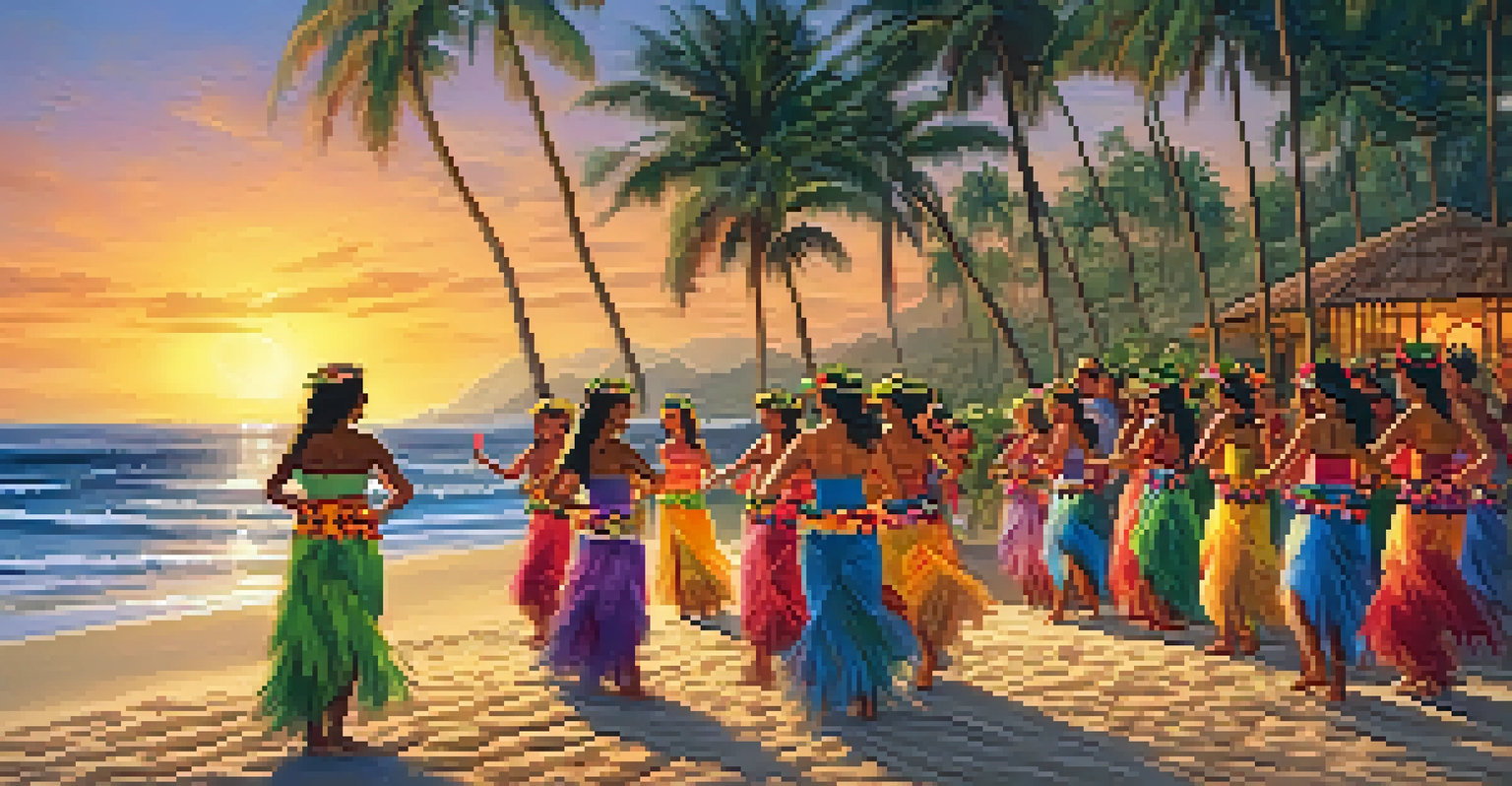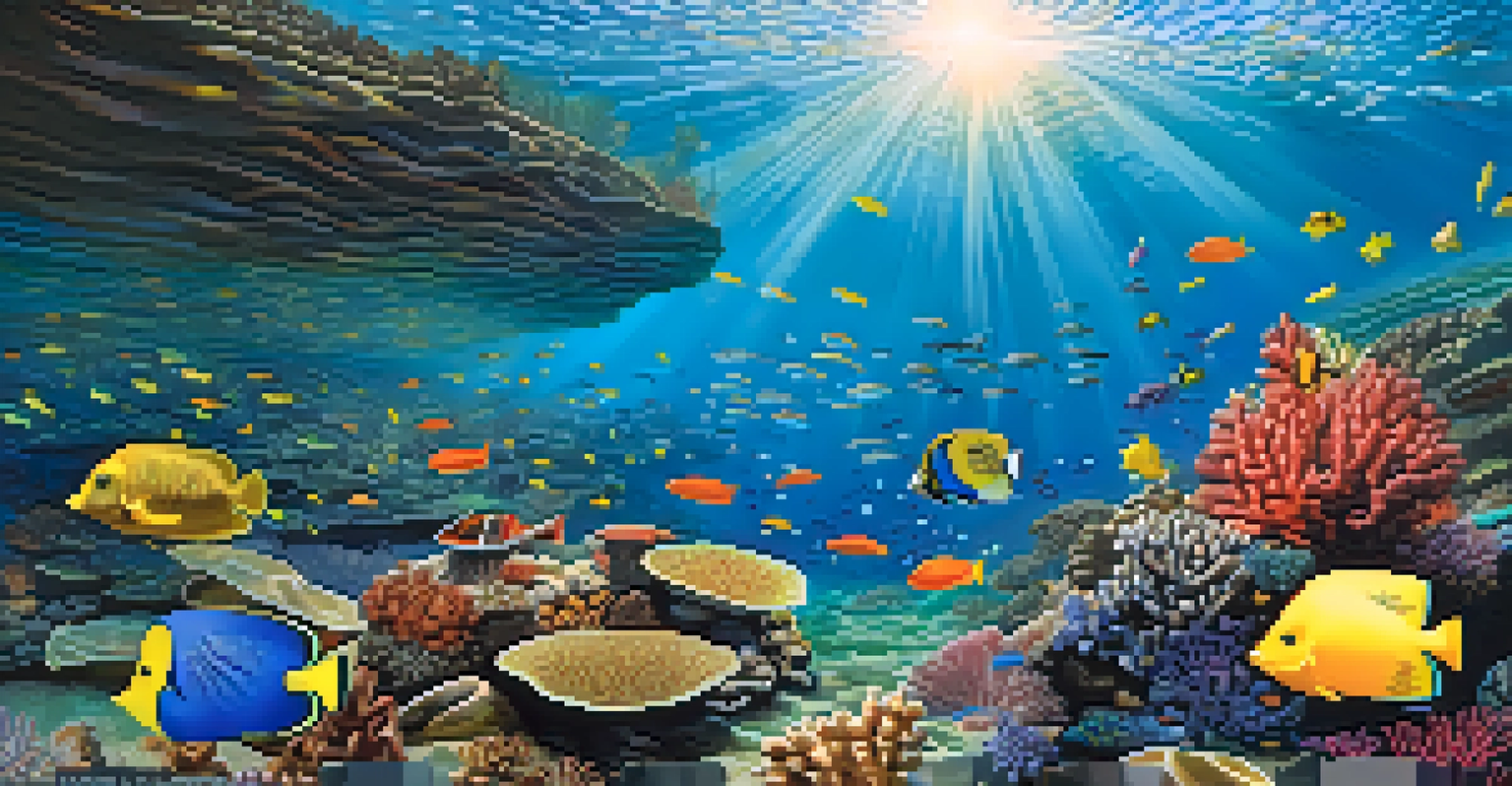Hawaii's Major Attractions: Boosting Tourism and Economy

The Natural Beauty of Hawaii: A Scenic Paradise
Hawaii's breathtaking landscapes are a major draw for tourists, showcasing a blend of lush rainforests, volcanic mountains, and pristine beaches. Each island offers its own unique charm, from the iconic beaches of Waikiki to the dramatic cliffs of Kauai's Na Pali Coast. This natural beauty not only attracts visitors but also fosters a deep appreciation for the environment, encouraging eco-tourism.
Hawaii is not just a place, it's an experience that captures the heart and soul of every traveler.
Tourists flock to Hawaii not just for relaxation but also for adventure. Activities like hiking in Haleakalā National Park or snorkeling in Molokini Crater allow visitors to immerse themselves in the islands' stunning natural settings. This connection to nature enhances the travel experience and often leads to repeat visits, boosting the local economy.
Moreover, the preservation of Hawaii's natural beauty has become a vital part of community initiatives. Local organizations work tirelessly to maintain and protect these landscapes, ensuring that they remain vibrant and welcoming for future generations. This commitment to conservation further elevates Hawaii's appeal as a sustainable travel destination.
Cultural Richness: Embracing Hawaiian Heritage
Hawaii's rich cultural heritage is another significant attraction, drawing visitors eager to experience its unique traditions. From hula dancing to traditional luaus, tourists are treated to vibrant displays of local customs and practices. This cultural immersion not only enriches the visitor experience but also fosters respect and understanding for Hawaiian history.

Many tourists seek to learn about the ancient Polynesian way of life, which adds depth to their visit. Places like the Polynesian Cultural Center provide interactive experiences that educate visitors on the islands' diverse cultures. By preserving and sharing these traditions, Hawaii not only attracts tourists but also strengthens its cultural identity.
Hawaii's Natural Beauty Attracts Tourists
The stunning landscapes and eco-tourism initiatives foster a deep appreciation for Hawaii's environment.
In recent years, there has been a growing emphasis on cultural tourism, which focuses on sustainable practices that benefit local communities. This approach ensures that tourism revenue contributes to the preservation of cultural sites and supports local artisans and performers, reinforcing the importance of heritage in Hawaii's economy.
Adventure Activities: Thrill-Seeking in Paradise
For those seeking adventure, Hawaii offers a plethora of exhilarating activities that cater to thrill-seekers. From surfing the legendary waves of Oahu's North Shore to zip-lining over lush valleys, the islands provide endless opportunities for outdoor enthusiasts. These experiences not only create lasting memories but also significantly contribute to the local economy.
The beauty of Hawaii is not just in its landscapes, but in the spirit of its people and culture.
Adventure tourism has become a lucrative sector for Hawaii, attracting a younger demographic eager for unique experiences. Companies offering guided tours, scuba diving lessons, and helicopter rides have flourished, creating jobs and stimulating local businesses. This trend highlights how adventure activities can drive economic growth while providing unforgettable experiences.
Additionally, many of these adventure experiences are designed with safety and environmental consciousness in mind. Operators often emphasize responsible tourism practices, ensuring that both visitors and the natural surroundings are protected. This balance between adventure and sustainability is essential for maintaining Hawaii's appeal as a top travel destination.
Culinary Delights: A Taste of Hawaii
Hawaii's culinary scene is a delightful fusion of flavors, making it a significant attraction for food lovers. From fresh poke bowls to traditional Hawaiian plate lunches, the islands offer a variety of dishes that reflect their diverse cultural influences. This gastronomic experience not only tantalizes the taste buds but also showcases local ingredients and culinary traditions.
Food festivals and farmers' markets are popular among both locals and tourists, creating vibrant community gatherings centered around cuisine. Events like the Hawaii Food & Wine Festival highlight the islands' rich agricultural bounty and promote sustainable practices. These culinary events contribute to the economy by attracting visitors and supporting local farmers and chefs.
Cultural Richness Enhances Visitor Experience
Hawaii's vibrant traditions and cultural tourism provide visitors with immersive experiences that promote understanding and respect for its heritage.
Moreover, the rise of food tourism has led to an increase in culinary tours and cooking classes, allowing visitors to engage with the local food culture. By exploring Hawaii's culinary offerings, tourists can deepen their connection to the islands and support the local economy, making dining a key part of their travel experience.
Wildlife Encounters: Connecting with Nature
Hawaii is home to some of the most unique wildlife in the world, making it a prime destination for nature enthusiasts. Tourists can witness the majestic humpback whales during their migration or explore the vibrant coral reefs teeming with colorful fish. These wildlife encounters provide unforgettable experiences that further enhance Hawaii's allure.
Ecotourism has gained traction as visitors seek responsible ways to enjoy and learn about Hawaii's natural habitats. Guided tours focused on wildlife conservation create awareness about the importance of preserving these ecosystems. This not only enriches the tourist experience but also contributes to the protection of Hawaii's diverse species.
Additionally, educational programs and conservation efforts aim to engage visitors in preserving Hawaii's wildlife. By participating in activities like beach clean-ups or wildlife monitoring, tourists can leave a positive impact on the islands. This connection fosters a sense of responsibility and encourages repeat visits, ultimately benefiting Hawaii's economy.
Shopping and Local Markets: A Unique Experience
Shopping in Hawaii offers a unique blend of local craftsmanship and global brands, making it a delightful experience for visitors. From handmade jewelry to traditional Hawaiian quilts, local markets showcase the islands' artistic talents. These shopping experiences not only provide tourists with souvenirs but also support local artisans and small businesses.
Popular destinations like the Ala Moana Center and various farmers' markets allow tourists to immerse themselves in the local culture while enjoying a day of shopping. Visitors can find everything from fresh produce to unique handicrafts, creating a vibrant atmosphere that reflects Hawaiian life. This interaction with local vendors enhances the overall travel experience.
Adventure Activities Boost Local Economy
Thrilling outdoor activities appeal to a younger demographic and significantly contribute to Hawaii's economic growth.
Moreover, the emphasis on supporting local businesses is becoming increasingly important in the tourism industry. Tourists are encouraged to shop locally, contributing to the economic sustainability of the islands. This trend not only benefits the economy but also fosters a deeper connection between visitors and the local community.
Events and Festivals: Celebrating Hawaiian Culture
Hawaii is known for its vibrant events and festivals, which celebrate its unique culture and traditions. From the Merrie Monarch Festival showcasing hula and music to the Aloha Festivals that honor the spirit of the islands, there is always something happening. These celebrations attract visitors from around the world, significantly boosting tourism.
These events provide tourists with a chance to engage with the local community, enjoy traditional performances, and savor local cuisine. The festive atmosphere fosters a sense of camaraderie among attendees, creating lasting memories. This interaction further enriches the visitor experience and encourages return trips.

Additionally, festivals often highlight the importance of preserving Hawaiian culture and traditions. By showcasing local artists, musicians, and chefs, these events help to sustain the cultural heritage of the islands while generating economic benefits. The positive impact of such gatherings on both tourism and the local economy is undeniable.